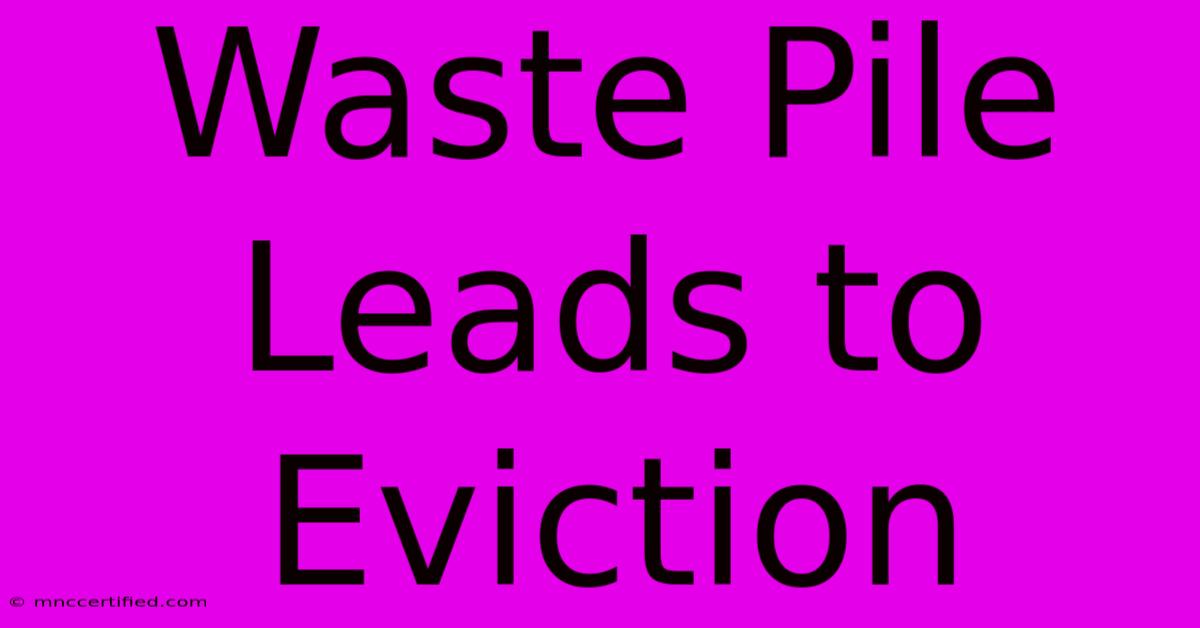Waste Pile Leads To Eviction

Table of Contents
Waste Pile Leads to Eviction: Understanding Your Tenant Rights and Responsibilities
Landlords have a legal right to maintain a habitable and safe property. A significant accumulation of waste, often referred to as a "waste pile," can violate lease agreements and lead to eviction. This article explores the legal ramifications of waste accumulation, tenant rights, and how to avoid eviction due to this issue.
Understanding Your Lease Agreement
The first and most crucial step is thoroughly reviewing your lease agreement. Many leases explicitly prohibit excessive waste accumulation, defining what constitutes a violation. Look for clauses regarding cleanliness, property maintenance, and health and safety regulations. These clauses often detail the landlord's right to enter the property to inspect and the consequences of non-compliance, which may include eviction. Pay close attention to specific language used; vague terms can be subject to interpretation.
What Constitutes a "Waste Pile"?
The definition of a "waste pile" isn't always clear-cut. It's more than just a few extra boxes or bags of trash. A waste pile typically involves:
- Excessive accumulation of trash: Beyond the normal amount of household waste generated.
- Hazardous materials: Items like chemicals, batteries, or flammable materials improperly stored.
- Attracting pests: Significant waste accumulation often attracts rodents, insects, and other pests, creating unsanitary conditions.
- Obstruction of access: Waste blocking walkways, fire exits, or other essential areas.
- Health and safety violations: Conditions that pose a risk to the tenant, other residents, or the property itself.
Note: The specific threshold for what constitutes a "waste pile" may vary depending on local laws and the terms of your lease.
Landlord's Rights and Responsibilities
Landlords are responsible for maintaining the structural integrity and habitability of the property. However, tenants are responsible for maintaining a clean and sanitary living space. A waste pile significantly impacts habitability and may violate local health codes. This allows landlords to take action, including:
- Issuing a written notice: Landlords are generally required to provide written notice outlining the violation and giving the tenant a reasonable time to remedy the situation.
- Entering the property (with proper notice): To inspect and potentially remove the waste, often at the tenant's expense.
- Eviction proceedings: If the tenant fails to comply with the notice, the landlord can initiate eviction proceedings through the court system.
Protecting Yourself as a Tenant
To avoid eviction due to a waste pile, consider these steps:
- Regular trash disposal: Establish a regular schedule for taking out the trash to prevent accumulation.
- Proper waste storage: Store waste in appropriate containers and keep them properly sealed.
- Hazardous waste disposal: Dispose of hazardous materials according to local regulations.
- Communication with your landlord: If you anticipate difficulties managing waste disposal, communicate with your landlord proactively.
- Document everything: Keep copies of your lease, all communication with your landlord, and any notices you receive.
Seeking Legal Advice
If you're facing eviction due to a waste pile, seeking legal counsel is crucial. An attorney can advise you on your rights, review your lease, and help you navigate the eviction process. Understanding your local tenant rights laws is equally important.
Preventing Future Issues
Proactive measures can prevent future problems. These include:
- Thoroughly review your lease: Understand your responsibilities concerning waste disposal.
- Maintain a clean living space: Regularly declutter and dispose of unwanted items.
- Establish a system for waste disposal: Create a routine for garbage removal to avoid buildup.
- Communicate openly with your landlord: Address any concerns or issues promptly.
By understanding your lease, local laws, and tenant rights, you can significantly reduce the risk of facing eviction due to a waste pile. Remember, proactive communication and responsible waste disposal are key to maintaining a positive landlord-tenant relationship.

Thank you for visiting our website wich cover about Waste Pile Leads To Eviction. We hope the information provided has been useful to you. Feel free to contact us if you have any questions or need further assistance. See you next time and dont miss to bookmark.
Featured Posts
-
Airport Tragedy Man Dies In Dublin
Nov 18, 2024
-
Lafayette Street Bond No 9 Review
Nov 18, 2024
-
Aus Wins T20 I Series Pak Names New Captain
Nov 18, 2024
-
Peter Kay Adds Manchester Show Dates
Nov 18, 2024
-
Nations League Italy Vs France Live Stream
Nov 18, 2024